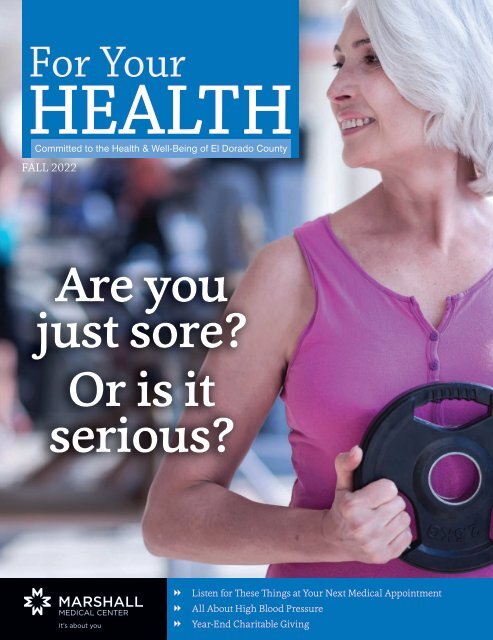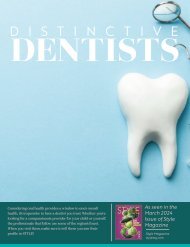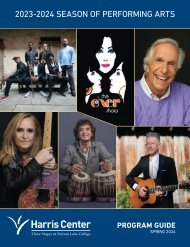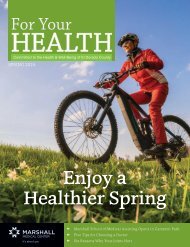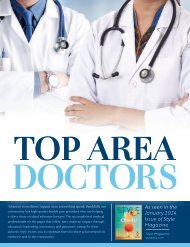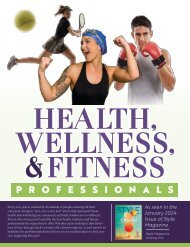Marshall - For Your Health - Fall 2022
For Your Health by Marshall Medical Center is intended to provide information about health in general as well as healthcare services and resources available in El Dorado County. Information comes from a wide range of medical experts. If you have any concerns or questions about specific content that may affect your health, please contact your healthcare provider.
For Your Health by Marshall Medical Center is intended to provide information about health in general as well as healthcare services and resources available in El Dorado County. Information comes from a wide range of medical experts. If you have any concerns or questions about specific content that may affect your health, please contact your healthcare provider.
Create successful ePaper yourself
Turn your PDF publications into a flip-book with our unique Google optimized e-Paper software.
Committed to the <strong>Health</strong> & Well-Being of El Dorado County<br />
FALL <strong>2022</strong><br />
Are you<br />
just sore?<br />
Or is it<br />
serious?<br />
<br />
<br />
<br />
Listen for These Things at <strong>Your</strong> Next Medical Appointment<br />
All About High Blood Pressure<br />
Year-End Charitable Giving
DID YOU KNOW<br />
Five Things You May Hear<br />
at the Doctor’s Office That<br />
Could Save <strong>Your</strong> Life<br />
Routine medical appointments<br />
help doctors detect potential health<br />
issues early, when they can be<br />
reversed or are more easily treatable.<br />
The following can be lifesaving if<br />
heard early enough.<br />
1.“<strong>Your</strong> cholesterol is high.” The<br />
risk of having high cholesterol<br />
can start as early as your twenties<br />
and increases with age. Too much<br />
LDL, or “bad” cholesterol in the<br />
blood causes plaque build-up in<br />
the artery walls. This puts you at<br />
higher risk for heart attack, stroke,<br />
and peripheral artery disease. With<br />
an early diagnosis you can begin<br />
to get levels back into a healthy<br />
range before it gets worse.<br />
SPECIAL AD SECTION<br />
2.“You may have heart disease.”<br />
Ever wonder what your doctor<br />
hears when he or she listens to<br />
your heart with a stethoscope?<br />
This is one way to find an irregular<br />
heartbeat, heart murmur, or other<br />
symptoms you wouldn’t notice<br />
on your own. Getting your heart<br />
checked regularly allows your<br />
doctor to monitor your heart<br />
and identify issues before they<br />
become fatal.<br />
3.“<strong>Your</strong> blood sugar is high.” About<br />
one-third of Americans with<br />
diabetes don’t know they have it.<br />
Uncontrolled diabetes can lead<br />
to heart disease, stroke, kidney<br />
disease, blindness, nerve damage,<br />
and erectile dysfunction. Getting<br />
diagnosed is the first step to<br />
controlling diabetes and avoiding<br />
health complications. <strong>Your</strong> doctor<br />
can recommend changes to<br />
your diet and exercise and may<br />
prescribe medication.<br />
4.“You may have prostate cancer.”<br />
Prostate cancer is one of the most<br />
common cancers in American<br />
men. One in eight men will be<br />
diagnosed with prostate cancer<br />
during their lifetime, according<br />
to the American Cancer Society.<br />
During routine exams, a doctor<br />
can check the prostate for possible<br />
abnormalities. Survival rates for<br />
prostate cancer are higher for<br />
patients who begin treatment early.<br />
5.“You’re at high risk for COVID-19<br />
complications.” Some health<br />
conditions increase your risk<br />
of becoming severely ill from<br />
COVID-19, including obesity,<br />
diabetes, heart conditions, and<br />
chronic lung problems. <strong>Your</strong> doctor<br />
can tell you if you’re at high risk<br />
of serious illness from COVID-19.<br />
This can empower you to take<br />
more precautions against the virus<br />
so you’re less likely to get sick.<br />
Make an appointment for a checkup<br />
with your doctor today to take<br />
control of your health. <strong>For</strong> more<br />
information about <strong>Marshall</strong> Medical<br />
providers, visit www.marshallmedical.<br />
org/find-a-doctor.<br />
2 | FOR YOUR HEALTH | www.marshallmedical.org
BETTER CARE FOR YOU<br />
ABOUT MARSHALL<br />
MEDICAL CENTER<br />
<strong>Marshall</strong> Medical Center<br />
is an independent,<br />
nonprofit community<br />
healthcare provider located in<br />
the heart of the Sierra Foothills<br />
between Sacramento and<br />
South Lake Tahoe. <strong>Marshall</strong><br />
Medical Center includes<br />
<strong>Marshall</strong> Hospital, a fully<br />
accredited acute care facility<br />
with 111 beds located in<br />
Placerville; several outpatient<br />
facilities in Cameron Park,<br />
El Dorado Hills, Placerville<br />
and Georgetown; and many<br />
community health and<br />
education programs. <strong>Marshall</strong><br />
has nearly 220 licensed<br />
providers and a team of over<br />
1,400 employees providing<br />
quality healthcare services<br />
to the residents of El Dorado<br />
County.<br />
<strong>For</strong> <strong>Your</strong> HEALTH is<br />
published as a community<br />
service by<br />
MARSHALL MEDICAL CENTER<br />
1100 <strong>Marshall</strong> Way<br />
Placerville, CA 95667<br />
telephone 530-622-1441<br />
or 916-933-2273;<br />
www.marshallmedical.org<br />
It is intended to provide<br />
information about health in<br />
general as well as healthcare<br />
services and resources available<br />
in El Dorado County. Information<br />
comes from a wide range of<br />
medical experts. If you have any<br />
concerns or questions about<br />
specific content that may affect<br />
your health, please contact your<br />
healthcare provider.<br />
To reach the editor of <strong>For</strong> <strong>Your</strong><br />
<strong>Health</strong>, contact Lourdes Edralin<br />
at 530-626-2675 or<br />
ledralin@marshallmedical.org<br />
What You Need to<br />
Know About High<br />
Blood Pressure<br />
When you think of people who have high<br />
blood pressure, do you think of older<br />
adults? People who don’t take care of their<br />
health? Or people with high stress? While<br />
this might be true, the fact is this health<br />
condition has no symptoms and patients<br />
can be young and seemingly healthy.<br />
What happens if you have high blood<br />
pressure?<br />
High blood pressure, or hypertension,<br />
occurs when the force of blood pushing<br />
against the walls of your blood vessels<br />
as your heart pumps and rests between<br />
heartbeats is consistently higher than it<br />
should be. This can lead to serious health<br />
risks, such as heart disease, heart attack,<br />
stroke, and kidney disease.<br />
How do you know if you have high blood<br />
pressure?<br />
The only way to know for sure is to<br />
measure it. “Since high blood pressure can<br />
cause serious health problems over time<br />
and since there are no obvious signs that<br />
you have the condition, it’s important to<br />
have your blood pressure checked by your<br />
doctor on a regular basis,” explains Scott<br />
Vasconcellos, MD, of <strong>Marshall</strong> Cardiology.<br />
It is recommended that people age 40 and<br />
older get their blood pressure checked<br />
once a year. If you are age 18 to 39 and<br />
are not at an increased risk for high blood<br />
pressure, you can get your blood pressure<br />
checked every three to five years.<br />
What causes high blood pressure?<br />
There are a number of factors that can<br />
contribute to high blood pressure. Some<br />
health conditions, such as obesity and<br />
diabetes, make you more prone to the<br />
condition. Unhealthy lifestyle habits, such<br />
as not exercising enough, eating too much<br />
sodium, smoking, drinking too much<br />
alcohol, and not managing stress, may<br />
also increase your risk. African Americans<br />
are more at risk of developing high blood<br />
pressure (and developing it at a younger<br />
age). You may also be more prone to the<br />
condition due to a genetics. Blood pressure<br />
also tends to rise as you get older.<br />
If you have questions or concerns, contact<br />
your doctor. <strong>For</strong> more information about<br />
<strong>Marshall</strong> Medical providers, visit www.<br />
marshallmedical.org/find-a-doctor.<br />
<strong>For</strong> more information about <strong>Marshall</strong> Medical Center, visit www.marshallmedical.org or follow us on<br />
Facebook/marshallmedicalcenter, twitter.com/<strong>Marshall</strong>Medical, on YouTube, LinkedIn and on Instagram<br />
SPECIAL AD SECTION<br />
www.marshallmedical.org | FOR YOUR HEALTH | 3
COVER STORY<br />
Are You Sore?<br />
Or Is It Serious?<br />
We’ve all heard it<br />
before. “No pain, no<br />
gain.” But how do you<br />
know if you’re sore from<br />
a tough workout or if<br />
you’ve injured yourself?<br />
When exercising, a certain level of physical discomfort<br />
is to be expected. Brandon Beamer, MD, of <strong>Marshall</strong><br />
Orthopedics & Sports Medicine in El Dorado Hills has<br />
provided some things to think about:<br />
Delayed Onset Muscle Soreness<br />
You’ve likely experienced delayed onset muscle soreness<br />
(DOMS) after trying a new exercise or adding more<br />
weight to your lifting routine. Typically, muscles begin to<br />
ache and tense a day or two later and can be eased with<br />
ice, massage, stretching, and over-the-counter pain and<br />
anti-inflammatory medications. DOMS is normal and will<br />
4 | FOR YOUR HEALTH | www.marshallmedical.org
Ice – Apply an ice pack to swollen or painful<br />
areas for five- to 15-minutes at a time for the<br />
first three days, avoiding direct skin contact<br />
with the ice.<br />
Compression – Soothe twisted or sprained<br />
ankles, knees, and other joints by tightly<br />
wrapping a long cloth bandage around the<br />
joint, while still allowing for blood flow.<br />
Elevation – Keeping the affected area raised<br />
above your heart as much as possible will<br />
reduce pain, swelling, and throbbing.<br />
improve within three- to five- days. You can<br />
continue with your daily activities and even<br />
keep working out.<br />
Minor Injuries<br />
Unlike with DOMS, you’ll notice minor injuries<br />
as a result of exercise or playing sports<br />
immediately to within a few hours. Symptoms<br />
include pain, tenderness, swelling, bruising<br />
or stiffness and can be treated at home. Dr.<br />
Beamer recommends the acronym RICE for<br />
these minor injuries:<br />
Rest – To avoid further injury, it’s best to rest<br />
the injured area for two to three days<br />
When to See an Orthopedist<br />
“You should see an orthopedist if you<br />
experience symptoms in the joint like clicking<br />
or popping, new onset swelling, limited range<br />
of motion, or a sudden change in motion or<br />
strength of the joint or if your minor injuries do<br />
not improve within the span of a few days to a<br />
week,” says Dr. Beamer.<br />
Don’t let an injury sideline your efforts.<br />
Remember that regular physical activity actually<br />
helps reduce joint stiffness and improves<br />
mobility. It also strengthens muscles around the<br />
joints, preventing future injuries. But if you have<br />
a concern, see your doctor right away.<br />
Call <strong>Marshall</strong> Orthopedics at 916-805-2320 to<br />
make an appointment today.<br />
SPECIAL AD SECTION<br />
www.marshallmedical.org | FOR YOUR HEALTH | 5
FOUNDATION NEWS<br />
<strong>Your</strong> Year-End<br />
Giving Checklist<br />
Reminders:<br />
Check these off your to-do list to<br />
end the year on an organized note.<br />
• Ensure that your will or trust<br />
is up to date and includes<br />
appropriate designations and<br />
charitable intentions.<br />
• Assess your retirement plan<br />
beneficiaries to ensure you’ve<br />
considered your loved ones and<br />
favorite causes.<br />
• If you have a life insurance<br />
policy that is no longer a<br />
significant piece of your estate<br />
plan, consider making <strong>Marshall</strong><br />
Foundation for Community<br />
<strong>Health</strong> the beneficiary.<br />
SPECIAL AD SECTION<br />
The end of the year is a time of<br />
reflection and anticipation. But it’s<br />
also a time to plan for important<br />
charitable considerations ahead of<br />
the last day of December.<br />
IRA Distribution<br />
• If you are 59½ or older, you can<br />
take a distribution from your IRA<br />
and then make a gift to a charity<br />
without penalty. If you itemize<br />
your deductions, you can take<br />
a charitable deduction for the<br />
amount.<br />
• If you are 70½ or older, you can<br />
give any amount up to $100,000<br />
from your IRA directly. You will not<br />
pay income taxes on the transfer.<br />
If you are 72 or older, you can use<br />
this transfer to satisfy your required<br />
minimum distribution.<br />
To do: The charity must receive your<br />
gift by Dec. 31 for your donation to<br />
qualify this year. If you have checkwriting<br />
privileges on your IRA, please<br />
account for time in the mail stream.<br />
Appreciated Stock<br />
• You may enjoy two tax benefits<br />
with a gift of appreciated stock:<br />
Avoid paying taxes on the<br />
appreciated value and qualify<br />
for an income tax charitable<br />
deduction based on today’s<br />
market value when you itemize.<br />
To do: Complete all transfers by<br />
Dec. 31. This includes electronic<br />
transfer, hand-delivery of the<br />
securities or mailed stock and<br />
stock power (mailed separately for<br />
security).<br />
As the end of the year<br />
approaches, <strong>Marshall</strong> Foundation<br />
for Community <strong>Health</strong> is here<br />
to help ensure you receive the<br />
maximum tax benefit for your<br />
donation. <strong>For</strong> free resources,<br />
contact Jamie Johnson, Executive<br />
Director, at 530-642-9984, e-mail<br />
info@marshallfound.org, or visit<br />
marshallfound.org.<br />
Donor Advised Fund<br />
• Contribute to a donor advised fund<br />
and enjoy a tax savings on that<br />
amount when you itemize.<br />
To do: Complete the contribution<br />
by Dec. 31. You do not have to<br />
designate the funds this calendar<br />
year to receive the tax benefits.<br />
6 | FOR YOUR HEALTH | www.marshallmedical.org
Just about everywhere you go these days, indoor<br />
mask mandates for public spaces have been<br />
dropped. In many communities, mask wearing<br />
is optional in stores, restaurants, schools, and<br />
even on public transportation. So why is it still<br />
a requirement that you wear a mask in healthcare<br />
facilities?<br />
FEATURE<br />
Why Do I Still Have to Wear a<br />
Mask in <strong>Health</strong>care Facilities?<br />
Since the beginning of the pandemic, the Centers<br />
for Disease Control and Prevention (CDC) has set the<br />
recommendations for mask wearing in hospitals and<br />
healthcare facilities. The CDC continues to recommend<br />
that everyone—including providers, staff, patients,<br />
and visitors—wear a mask while in the building.<br />
This masking recommendation applies regardless of<br />
vaccination status.<br />
Why are masks still required in healthcare facilities but<br />
not in other places?<br />
Wearing a mask in a hospital or healthcare facility helps:<br />
• Protect you. While medical staff does their best to<br />
reduce risk, you are more likely to come into contact<br />
with a COVID-positive person in a hospital or clinic.<br />
Wearing a mask helps protect you from becoming<br />
infected with COVID-19 if others are sick.<br />
• Protect others. The other patients and visitors may<br />
be more at risk of developing serious complications if<br />
they get COVID-19. Wearing a mask makes it less likely<br />
you’ll spread the virus if you have it, especially if<br />
you aren’t feeling or showing symptoms.<br />
• Avoid staffing shortages. At the height of the<br />
pandemic, it wasn’t the number of beds that limited<br />
hospitals’ abilities to take on more patients, it was<br />
the number of staff to care for the patients in those<br />
beds. When staff members get COVID-19 and<br />
need to stay home, it can be difficult for facilities<br />
to provide the level of care needed. Mask wearing<br />
makes it less likely this will happen.<br />
SPECIAL AD SECTION<br />
www.marshallmedical.org | FOR YOUR HEALTH | 7
OTHER NEWS<br />
Welcome New Providers to <strong>Marshall</strong> Medical Center<br />
<strong>For</strong> a complete list of healthcare providers, visit marshallmedical.org/find-a-doctor<br />
Chelsea Brekke, PA-C<br />
Orthopedics & Sports Medicine<br />
916-805-2320<br />
Chelsea attended San Diego State University where she earned<br />
a bachelor’s degree in kinesiology and the University of the<br />
Pacific, where she earned a master’s degree in physician<br />
assistant studies.<br />
Wai Kan (Karen) Chiu, MD, PhD<br />
Gastroenterology<br />
530-672-7040<br />
Dr. Chiu attended UC Berkeley, earning her undergraduate<br />
degree in molecular and cell biology before going on to achieve<br />
her medical degree and PhD from the University of Pittsburgh.<br />
Rachelle D’Angelo, FNP-C, MSN<br />
<strong>Marshall</strong> Family Medicine – Cameron Park<br />
530-672-7000<br />
Rachelle received a bachelor’s degree in psychology from the<br />
University of Maryland, College Park and a second degree in<br />
nursing from Johns Hopkins. She earned her master’s degree<br />
in nursing from Georgetown University.<br />
Gordon Thomas Fahey, MD<br />
General Surgery<br />
530-626-3682<br />
Dr. Fahey earned his bachelor’s degree from Georgia Institute of<br />
Technology, medical degree from the Medical College of Georgia<br />
and residency from UCSF. He is board certified in surgery and<br />
is a fellow of the American College of Surgeons. Dr. Fahey<br />
specializes in minimally invasive robotic-assisted surgery.<br />
Delandy McConnell, DO<br />
General Surgery<br />
530-626-3682<br />
Dr. McConnell earned a bachelor’s degree in biochemistry<br />
from UCLA and a doctorate from Lake Erie College of<br />
Osteopathic Medicine.<br />
Heather Overman, MD<br />
<strong>Marshall</strong> Pediatrics<br />
530-626-1144<br />
Dr. Overman graduated from UC Davis with a bachelor’s<br />
degree in neurobiology, physiology, and behavior. She also<br />
received her medical degree and completed her pediatrics<br />
residency at UC Davis.<br />
Sarah Snyder, FNP<br />
<strong>Marshall</strong> Family Medicine – Cameron Park<br />
530-672-7000<br />
Sarah earned a bachelor’s degree in nursing from Point Loma<br />
Nazarene University and a master’s degree in nursing from<br />
Frontier Nursing University.<br />
Nathan Woolsey, MD<br />
General Surgery<br />
530-626-3682<br />
Dr. Woolsey earned his bachelor’s degree in biology from<br />
Pepperdine University and went on to earn his medical degree<br />
from Michigan State University.<br />
SPECIAL AD SECTION<br />
8 | FOR YOUR HEALTH | www.marshallmedical.org


